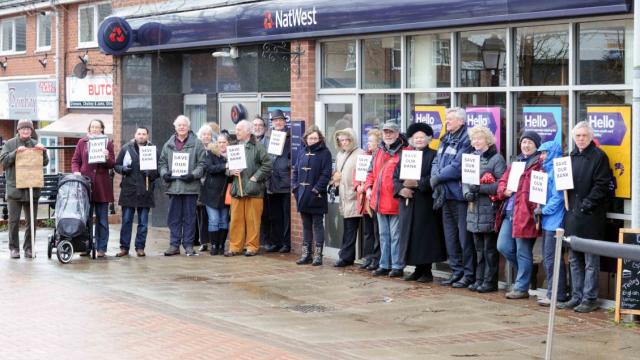
Popping into a local branch of your bank in the U.K. isn’t what it used to be. Due to a series of closures of local branches in the High Peak district of Derbyshire in North West England, I was forced to drive about seven miles to finally find a branch that was open. By then, the petrol I'd spent getting to the bank virtually ate up the value of the cheque I was paying in.
More and more local branches of banks are closing their doors throughout the U.K., many in less affluent and rural communities. A report by Citizens Advice Derbyshire Districts reveals that between 2015 and 2017, 1,046 bank branches have been closed in Britain.
Within the High Peak, a rural area in and around the Peak District National Park, six local banks have closed during this period. Out of the 25 market towns, villages and hamlets that make up the High Peak, there are just four places customers can now visit for face-to-face banking.
The High Peak, a beautifully hilly and verdant part of Britain with a strong community spirit, is far from the nation’s most affluent area. The High Peak’s Economy and Business Base shows salary levels for full-time workers in the district have remained static over the last five years. The data reveals that in 2016, full-time workers in the High Peak earned an annual average of £23,901 – significantly lower than the £26,300 median household income in the U.K. that year.
More broadly, Office for National Statistics data shows that more than 90 percent of local bank closures have been in places where the median income is below the British average, which is now £27,600. By contrast, five of the eight branches opened by the banks in 2015 and 2016 were in the wealthiest parts of the country – predominantly the richest parts of London including Chelsea, Canary Wharf, St Paul’s, Marylebone and Clapham.
The banks cite falling revenues as the reason why they are having to cut costs by closing branches and reducing staff during an era of increased online banking. However, the survey conducted by Citizens Advice paints a notably different picture from what the banks claim – that we’re a nation of online bankers – with 70 percent of the survey’s respondents saying they're still going into a branch to withdraw money.
The trend to shut down branches located away from the larger cities and more affluent suburbs is creating growing resentment. Particularly, it's been criticized for demonizing people in poorer and more rural communities who may not have the finances, access or technological skills to use online banking, and don’t have the financial means or ability to travel further afield to a bank that’s open.
As Fionn Travers Smith of the ethical banking campaign group Move Your Money told Reuters: “We are witnessing the creation of a dual financial system: one for the middle class and wealthy and another for the poor.”
In the High Peak, with its mere four banks left open, older or disabled consumers who are unable to travel no longer have the option of face-to-face banking – unless they rely on others to bring them to a branch further afield, thus taking away their independence.
Dawn Mackenzie, research and campaigns advice officer at Citizens Advice, told Occupy.com:
“As our on-the-ground report shows, a reduction in local banking services can have a real impact on the lives and financial security of many people. Older people, those who are isolated by long-term health conditions, and rural communities can face real barriers to accessing alternative banking services due to limited transport links or poor broadband coverage. We’re continuing to develop our service through our network of advice offices and 60-plus outreach [centers] to address these barriers.”
In light of the report on the impact of bank closures in the High Peak, Citizens Advice is urging government to take a more active role to make sure rural communities and vulnerable consumers aren't being overlooked by local bank closures.
Ruth George, a Labour MP for High Peak, is taking a proactive stance on bank closures by pressing the government for a review of both banks and ATM cash machines. Beyond the closure of banks, George warns that cash machines are now also under threat, as U.K. banks that operate ATMs known as LINK are no longer willing to pay the true cost of providing the service, and are reducing the fee they pay for cash machines by 20 percent. George warns that such a move would make cash machines in rural areas unviable.
Many shops and local businesses in small towns and villages can’t always afford the financial burden of having credit and debit card payment facilities. This means the loss of ATMs could directly and negatively affect them, since formerly cash-paying customers will no longer have the sources from which to draw out cash.
The Labour MP is calling on the government to enable a free-to-access cash network across all communities in the U.K., and to celebrate the positive impact the availability of cash has on local businesses, particularly in rural communities.
Ruth George told Occupy.com she fully agrees with Citizens Advice's recommendation that banks conduct an Impact Assessment of any proposed closure and make the information public – and that the government commission an independent review of bank branch closures and their impact, especially on rural communities.
Bank closures and the rise of payday loans
One of the crudest and most severe implications of local bank closures has been the rise of ruthless payday lenders. In 2017, complaints about payday loans increased sharply for a second consecutive year despite new rules that limit the eye-wateringly high levels of interest such lenders charge desperate borrowers. The crackdown on this unscrupulous form of lending has meant that since 2015, payday loan interest rates have been capped to 0.8 percent per day of the amount borrowed.
Caroline Wayman, chief financial ombudsman at the Financial Ombudsman Service, told the BBC that the rise in complaints has been noticeably related to people having trouble with credit. "It is clear that financial difficulties and financial exclusion remain significant challenges for many people,” she said.
A study conducted by Nottingham University links payday lending to bank closures, claiming that when local branches close, less regulated financial institutions such as payday lenders and cash-checking centres “fill the void at a higher cost to customers.”
It's no secret that the ongoing closure of banks in rural communities is taking its toll on consumers. Catrin Kearey, a resident of New Mills, recently went to pay cash into the NatWest bank in her town only to find its doors were boarded up. She later told Occupy.com:
“I was surprised to find the branch shut, as I had no idea it was closing and don’t remember being notified. Consequently, I didn’t manage to pay the cash in. I hope banks are taking a more active role in warning people where they are closing, as some customers, such as the elderly, will rely on face-to-face banking and will need to make alternative arrangements in advance.”
3 WAYS TO SHOW YOUR SUPPORT
- Log in to post comments














